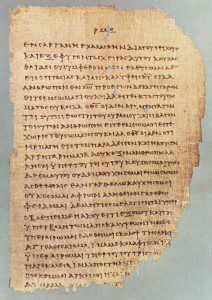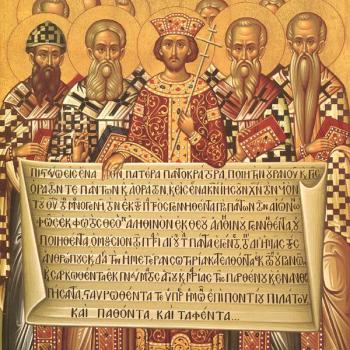
One of the problems of modern Christianity is that so few are trained to read Scripture in its original languages, or know the commentary material behind each text. This is why so many, indeed most, end up reading into Scripture whatever they want to come out of it. Whatever theological hermeneutic they have coming to the text, given to them by their theological tradition, they readily bring out of it, making it seem as if their opinions are one and the same as the meaning of the text itself.
This is not a new problem, but with the rise of the printing press and the ability for many people to read a translation of Scripture for themselves, the problem has become greater than before. Many readers end up assuming that the text should be simple enough to understand that they can pick it up and get its meaning right. This serves as the foundation for their other assumption, that they can pick up Scripture and read it, getting out of it what it means, without the intervention or help of anyone else. The fact that they are relying upon translators, and so someone is indeed interpreting the text for them, is lost to them, and if someone tries to tell them this, they find all kinds of excuses in order to hide from themselves that they are indeed trusting in someone else for the interpretation of the text.
Relying upon a translation of Scripture, without the commentary tradition behind it, hides much of the meaning of the text to the reader, allowing them to easily go astray with their reading. Commentaries can put the translated text back into context, and can help someone understand not only the significance of the individual words used in the original text, but also the grammatical ramifications which were understood by its original audience. It should go without saying, but alas, is often not understood by most reading Scripture, not only is much of its potential meaning is lost in translation, but also, it is easily to try to use the grammatical implications of a translated to text to make the text mean the opposite of its original intent, or to create a theological notion which might accidentally be implicit in the way the text is rendered in translation which would be impossible if the original was read.
One of the best examples of what can go wrong, and how a text can be easily misconstrued even by a good translation, can be found in the opening of the Gospel of John.
In English, people are familiar with the text, “In the beginning was the Word.” This is how most Bibles translate, “Ἐν ἀρχῇ ἦν ὁ Λόγος” (en archē ēn o logos). In English, the text looks as if it were talking about a temporal event, “In the beginning,” and in that event, was (past tense) the Word (or Logos). While this is a possible reading of the text, most of the possible meanings of the Greek are lost. What remains, what most readers get out of the text, is a temporal reading of Gospel passage, a reading which ends up causing all kinds of theological problems. What are we to make of the Logos? Was the Logos only to be found at the beginning of time, allowing that when time was not, the Logos was not? Can the Logos be said to be “before” the beginning, or does it come into existence at the beginning so that its being itself is one with the foundation of time?
The rest of the verse, in English, continues to provide a similar temporal misunderstanding: “and the Word was with God, and the Word was God,” that is, καὶ ὁ Λόγος ἦν πρὸς τὸν Θεόν, καὶ Θεὸς ἦν ὁ Λόγος (kai o logos ēn pros ton theon kai theos ēn o logos). Once again, the text appears to suggest this was all in the past. At the beginning of time, the Word was with God, while somehow the Word was also associated with God. Moreover, the ambiguity of “and the Word was God” as it is found in Greek is not able to be seen in the English, for the text could read “and a God was the Word” or “and God was the Word” because of the lack of a definitive article in front of the word for God, Θεὸς.
Without any external commentary and presupposition going into the text, it is easy to see how the passage could and would normally be read: at the beginning of time was the Word, and the Word was with God at that point in time (but moved away from God afterward), and so was said to be a God at that time. What happened afterwards? Why does the text say it was God and not that it is God? Does this not imply the possibility that, thanks to time, the Word lost its association with the divinity?
Christology, therefore, becomes difficult if not impossible, when a simple reading of the text is used to establish the identity of Christ. Implications will be read in the text thanks to how it is rendered into English; they are valid and indeed, the most straight forward reading if the text is not interpreted with an external hermeneutic, and yet what results is quite different from the meaning as found in the Greek.
Let us start by looking at ἦν, ēn, that is, the word used for “was” in English translations. ἦν, ēn, in Greek is imperfect; the imperfect is used for the simple past, but also for events which started in the past but are said to continue without completion (or end). When John writes that the Word “was” with God, the word does not have to indicate something which happened merely in the past, but can be seen to represent the continuous presence of the Word with God. Likewise, then, the Word “was” God does not have to mean the Word once was God; rather, it can be seen to suggest that the Word was, and is, and continues to be God. This is lost in translation, but in the Greek, is easily ascertained, undermining therefore the simple reading of the text as it is rendered into English.
Likewise, we find much possible meaning and understanding is lost when we consider the word translated as “beginning,” that is, ἀρχῇ, archē. While ἀρχῇ can mean beginning, in a temporal sense, that is a far more restricted use of the word and not the kind which was normally associated with it in metaphysical discussions. It can be and should also be seen as a word associated with leadership, authority, or foundations. A leader or principle of authority can be said to be an “archon,” which is why Gnostic writers would talk about the various “archons” which preside over creation. An “archon” is a ruler because they are in the “lead.” Leadership or authority was seen to reside at those who come first, who are at the head of a line, similar to the way “priority” indicates authority to someone who is “prior” to another.
We can therefore read the text, Ἐν ἀρχῇ ἦν ὁ Λόγος, en archē ēn o logos, as: In the ἀρχῇ (archē) was and continues to be the Word. That is in the principle of power and authority which exists prior to creation, the archon, was, is, and ever shall be the Word. Therefore, when we look to the principle foundation behind creation, we have the archon, that is God, and in that archon, with that archon, we find the Word. For the Word was with that principle behind creation, and so is indeed said to be God. When looking to the principle foundation of the world, that is to God and the Godhead, the Word is found, for the Word was with the divinity in that principle foundation of the world, and indeed, is God.













